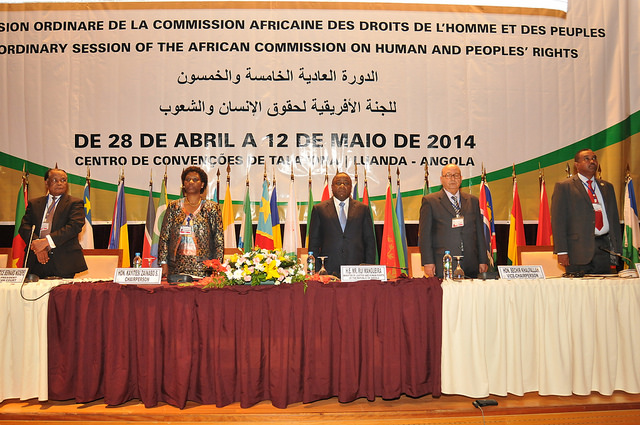
Credit: ACHPR
The African Commission on Human and Peoples’ Rights (ACHPR) opened its 55th Ordinary Session on April 28, 2014 in Luanda, Angola. During this session, which continues through May 12, the Commission is scheduled to discuss the human rights situation in Africa, consider State reports, and hear activity reports from members of the Commission and its special mechanisms. [ACHPR]
55th Ordinary Session
According to the public session agenda, the 55th Ordinary Session began with discussions of the human rights situation in Africa during which State delegates, intergovernmental organizations, national human rights institutions (NHRIs), non-governmental organizations (NGOs) and other relevant stakeholders had the opportunity to make oral statements to the Commission. Representatives from civil society, including Amnesty International and CIVICUS, used this opportunity to draw attention to the troubling human rights situation in many African States and call on the Commission to take action. [Amnesty International; CIVICUS]
During a one-hour session on the second day, the Commission considered applications for affiliate and observer status from NHRIs and NGOs.
The Commission then considered the scheduled periodic reports from the Republic of Mozambique, the Sahrawi Arab Democratic Republic, and the Republic of Liberia. During these sessions, the agenda allotted 45 minutes to each State’s presentation of its report, 20 minutes to the Commissioner Rapporteur assigned to the State, 10 minutes each for Commissioner’s questions and comments, 30 minutes for the State’s response, and 20 minutes for concluding remarks by the Commissioner Rapporteur and Chairperson.
Finally, the Commission heard activity reports from members of the Commission and the special mechanisms, including rapporteurs, committees and working groups, on the following topics:
- Rights of Women in Africa
- Rights of Older Persons and People with Disabilities in Africa
- People Living with HIV (PLHIV) and those at Risk, Vulnerable to and Affected by HIV
- Extractive Industries, Environment and Human Rights Violations
- Death Penalty and Extra-Judicial, Summary or Arbitrary Killings in Africa
- Human Rights Defenders in Africa
- Indigenous Populations/Communities in Africa
- Prevention of Torture in Africa
- Freedom of Expression and Access to Information in Africa
- Economic, Social and Cultural Rights in Africa
- Prisons and Conditions of Detention in Africa
- Refugees, Asylum Seekers, Internally Displaced Persons and Migrants in Africa
Following each presentation, the Commission allotted time for States, NGOs and NHRIs to pose questions and comments.
Public sessions will resume on May 12 for the conclusion of the 55th Ordinary Session. [ACHPR] Additional documentation, including the Final Communique, will be available online following the conclusion of the session.
NGO Forum
In the three days leading up to the Commission’s current session, NGOs, experts and representatives of the Commission gathered at the NGO Forum. The NGO Forum is intended to foster cooperation among the participants and provide an opportunity for discussion prior to the start of each ACHPR session. This meeting of the NGO Forum covered three thematic areas: the status of human rights and democracy in Africa, special interest groups, and networking for human rights. [ACDHRS: Information Brochure]
During the NGO Forum, participants also had the opportunity to engage in special interest group discussions on topics that mirrored the scheduled activity reports from members of the Commission and special mechanisms. [ACDHRS: Special Interest Group Discussions]
Participants in the NGO Forum developed recommendations for the Commission to consider during the current session. [ISHR] The International Service for Human Rights, one of approximately 200 NGO participants, reported that during this meeting of the NGO Forum participants called on the Commission to adopt resolutions on the protection of human rights defenders, gender identity and sexual orientation, and the criminalization of homosexuality in Uganda. Participants also specifically requested a general comment on Article 7b of the Maputo Protocol on the rights of women, to further analyze the “normative content of the right of women to property and land.” [ISHR]
Following the conclusion of the NGO Forum, many participating organizations took an active role in the actual ACHPR session. As is its practice, the Commission invited NGOs who have been granted observer status with the Commission to attend and participate in the session.
The African Commission
The African Commission on Human and Peoples’ Rights is the body responsible for the protection and promotion of human rights in the 53 Member States of the African Union. All of the Member States have ratified the African Charter on Human and Peoples’ Rights.
The Commission holds two ordinary sessions each year and may also hold extraordinary sessions at the request of the Chairperson of the Commission or a majority of Commissioners. During ordinary sessions, the Commission considers periodic reports submitted by States, as well as reports from members of the Commission and its special mechanisms. Additionally, the Commission may consider reports concerning country visits, or special missions, which are typically dispatched to countries experiencing political or social unrest.
The Commission also accepts communications, or complaints, from individuals, groups of individuals, NGOs, and States concerning alleged violations of the African Charter on Human and Peoples’ Rights.
More information on the African human rights system is available on IJRC’s Online Resource Hub.
